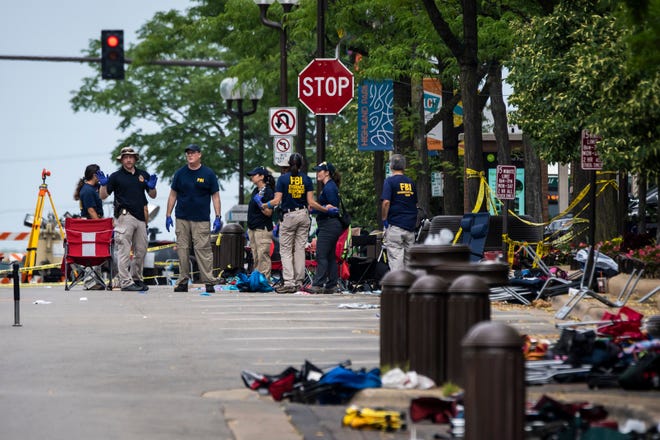
Marketing practices from gun maker Smith & Wesson were designed to generate sales from people like the gunman who opened fire on the Highland Park July 4 parade, according to one of several new lawsuits filed Wednesday by massacre victims and families grieving loved ones who were fatally shot in the tragedy.
The lawsuits largely focus on Smith & Wesson but also include the accused gunman, his father and the gun store that sold the weapon identified by authorities in the shooting.
A central claim of the legal action is that the gun manufacturer behind the M&P 15 semiautomatic rifle illegally targeted young men at risk of violence with advertisements for firearms.
The Fourth of July shooting at a parade in the Chicago suburb of Highland Park left seven people dead and wounded nearly 40 more. Everytown Law, law firm Romanucci & Blandin, LLC and Brady, alongside additional firms, announced the suits at a press conference Wednesday afternoon.

"It simply did not have to happen," Antonio Romanucci of Romanucci & Blandin said at a press conference Wednesday. "(Smith & Wesson's) marketing of the M&P 15 was unfair and deceptive because they knew that these marketing and sales practices promote and sell an image that caters to and attracts individuals just like the shooter."
Liz Turnipseed, who was shot in the pelvis during the shooting, is the lead plaintiff suing the manufacturer. Her suit claims the company should have been aware its advertisements would appeal to "impulsive young men with hero complexes and/or militaristic delusions attracted to using the particularly high lethality of AR-15 style weapons ... to effectively execute their fantasies,” her attorneys argue.
The suit alleges Smith & Wesson ads mimic a first-person shooter perspective depicted in many popular video games, utilize visuals of apparent military or law enforcement personnel and emphasize the gun's combat features.
AUGUST:Boy paralyzed in Highland Park shooting to start 3rd grade this fall with twin brother
WATCH:Highland Park shooting suspect confessed to rampage, remains in custody without bail
“The advertisements and marketing tactics described above demonstrate that Smith & Wesson knowingly marketed, advertised, and promoted the Rifle to civilians for illegal purposes, including to carry out offensive, military style combat missions against their perceived enemies," her attorneys argue.
Lauren Bennett, who attended the parade with her husband and her six and nine-year-old sons, was shot twice in her hip and back at the parade.
"My family and I are calling for full accountability for all those who contributed to the fear, the physical and emotional pain, and the unthinkable nightmares, that now define our lives," Bennett said Wednesday.
Lawsuits against gun manufacturers related to mass shootings have faced a multitude of legal roadblocks due to the 2005 Protection of Lawful Commerce in Arms Act, which grants gun manufacturers immunity from lawsuits related to crimes committed with their products.
But the lawsuits targeted at Smith & Wesson follow a similar approach to that of the families of the victims in the 2012 killings at Sandy Hook Elementary school, who received a $73 million settlement from the Remington firearm company that manufactured the rifle used in the shooting — likely the largest settlement of its kind for a mass shooting.
Families of Sandy Hook victims claimed Remington violated Connecticut consumer protection law by marketing its guns to young men with existing risk of committing violence. A lawyer at the center of the Sandy Hook settlement issued a letter in June to the maker of the AR-15 used in Uvalde Elementary School mass shooting on behalf of the father of one of the victims, seeking answers about marketing their products to teens and children.
In addition to Smith & Wesson, the accused gunman and his father, the victims are also suing Red Dot Arms, the gun store where the accused gunman purchased the weapon and Bud’s Gun Shop, an online gun distributor.
Are gun advertisements in FTC’s crosshairs? Critics decry ‘toxic’ messaging as firearm sales soar
Prosecutors have said 21-year-old Robert E. Crimo III confessed to the shooting when police arrested him, and he currently faces 21 counts of first-degree murder, 48 counts of attempted murder and 48 counts of aggravated battery.
Despite multiple warning signs ahead of the shooting — including two visits from police in 2019 and videos posted by the gunman featuring guns, school shootings and nihilistic themes about suicide and death — Crimo was able to legally purchased at least five guns, including the Smith & Wesson M&P15 semi-automatic rifle that he's accused of using in the attack.
Contributing: The Associated Press

Source link







